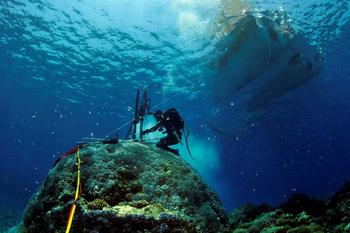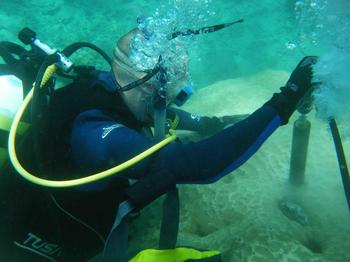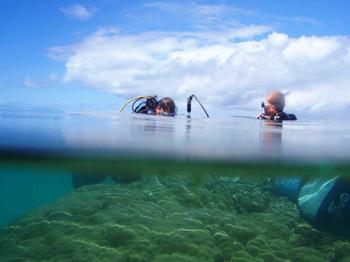Climate Change Already Started 180 Years Ago
Scientists drilling coral on the Rowley Shoals, a group of three coral reefs protruding from the water similar to atoll coral reefs off the northwestern coast of Australia.
Image Credit: Eric Watson, AIMS (Australia)
Dr. Jens Zinke drilling coral in Madagascar. The data obtained from these samples were included in the study mentioned above.
Image Credit: Charlotte Spliethof
Dr. Jens Zinke (at right) and a colleague drilling coral in Madagascar.
Image Credit: Charlotte Spliethof
Study indicates industrial revolution had noticeable impact on global warming.
News from Sep 05, 2016
An international research team has now found out that climate change already began 180 years ago, much earlier than believed up to now. To determine the earliest time of global warming, the scientists studied the so-called natural climate archives of the northern and southern hemispheres, both on land and in the oceans, from the past 500 years. These natural climate archives consist of tropical corals, sediment cores, stalagmites, tree rings, and ice cores. In addition, they analyzed models on climate development covering several thousand years. "Our data indicate that the early global warming in connection with rising concentrations of greenhouse gases is already a result of the industrial revolution," says Dr. Jens Zinke, a paleontologist at Freie Universität Berlin and co-author of the study recently published in Nature.
At the beginning of the industrial revolution, a comparatively small amount of greenhouse gases were released, but nonetheless, it can be demonstrated that they contributed to the onset of global warming, according to Zinke. The findings also indicate that volcanic eruptions, which were frequent in the early 19th century, only had a small influence on the start of global warming.
The study shows that the warming began in the 1830s in the Arctic and the tropical oceans, followed by Europe, Asia, and North America. The warming of large parts of the southern hemisphere appears to have occurred about 50 years later. According to the scientists, this could be due to the great regional differences in ocean currents: warm waters are naturally transported toward the north and away from the Antarctic. The data are still too uncertain for more precise statements, for example, about warming in the Antarctic.
"Up to now most of the available data were based on investigations in the northern hemisphere," says Zinke. Now for the first time climate archives on land and in the oceans of the northern and southern hemispheres were analyzed at the same time. "We were able to draw on temporally highly detailed climate archives of both tropical and extratropical oceans as well as both hemispheres."
Zinke himself studies tropical coral from the Indian Ocean, the Caribbean, and the Indonesian archipelago, and reconstructs the ocean temperatures of the past 400 years. His data were also included in the analysis. "Tropical corals grow continuously up to 400 years. Due to their rapid growth of one to two centimeters pro year, it is possible to analyze them month by month over many decades and centuries," says Zinke.
The findings of the international study, which was led by Dr. Nerilie Abram of the Australian National University in Canberra, provide important insights regarding the onset of human influence on the Earth's climate. They show that climate change is not just a phenomenon of the 20th and 21st centuries, but that it is necessary to go back at least 180 years to get reliable data on the warming of our planet and its causes. This also affects predictions about future climate change.
Jens Zinke is a researcher at the Institute of Geological Sciences, Freie Universität Berlin, and a member of the international Past Global Changes 2000 Year (PAGES 2K) consortium, under whose auspices the 25-member research team from Australia, the United States, Europe, and Asia collaborated.
Nerilie J. Abram, Helen V. McGregor, Jessica E. Tierney, Michael N. Evans, Nicholas P. McKay, Darrell S. Kaufman & the PAGES 2k Consortium, Early onset of industrial-era warming across the oceans and continents, in Nature 536, 411–418 (25 August 2016) doi:10.1038/nature19082



